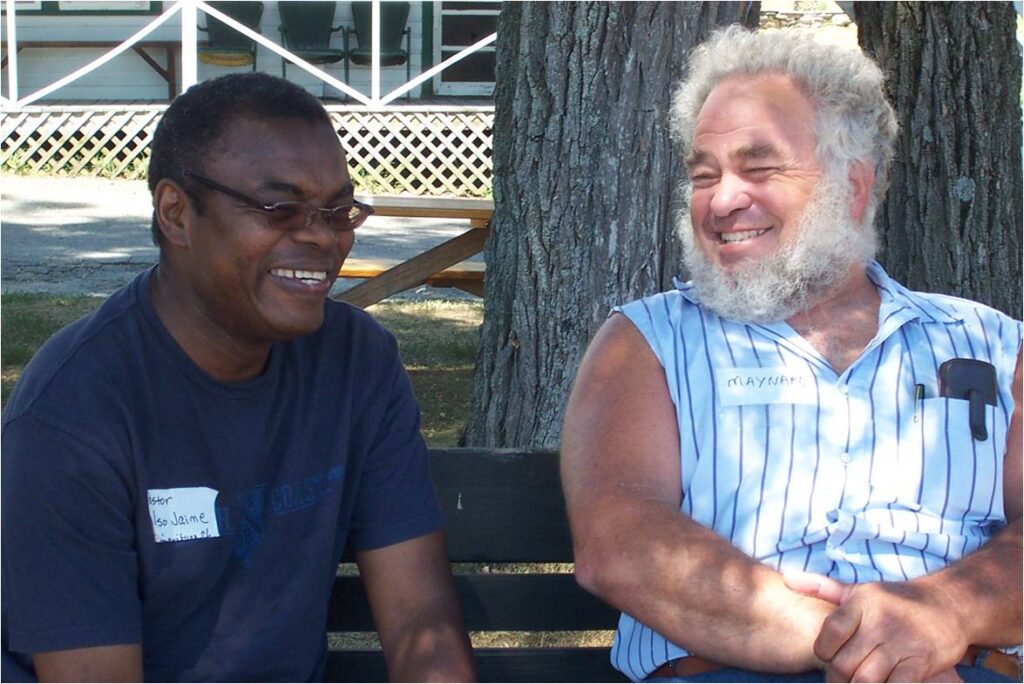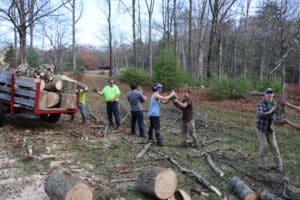Cross-Cultural Appreciation
Maynard Shirk was born into a traditionally Mennonite family. For him, that meant he could trace his roots to Shirks in France and Germany almost10 generations back. He grew up learning Pennsylvania Dutch and English at the same time and he knew almost everyone who lived around him. When he went to college, he was able to expand his horizons and make friends who looked and thought differently than he did, but that wasn’t enough for Maynard. He went to Vietnam through the Eastern Mennonite Board of Missions and volunteered through Mennonite Disaster Service in Honduras. He found out about Camp Deerpark while working in Honduras in 1974, when Dale Stoltzfus, who worked with the churches of New York City, came to visit.
“He was the camp program director at Camp Deerpark at the time, and he invited me to come work on maintenance,” Maynard said. “I promptly agreed and that’s how I first came to camp.”
Maynard worked at camp for about two years before he got another job offer at Camp Hebron, in Halifax, Pennsylvania. For about 10 years Maynard was absent from Camp Deerpark, but eventually he found his way back. He joined the board of directors and served on the board for many years. Now he is semi-retired and comes back to help out around the camp.
Maynard recognized that Camp Deerpark was a place that allowed him to expand his horizons. “I learned how parochial my upbringing had been and how poor I was at communicating with people that didn’t look like me,” he said. One of the largest lessons that he took away was learning to relate to people from various cultural backgrounds. “It’s been one of the places where I keep a little bit plugged in with cultural diversity, with Mennonites of many colors and stripes and languages,” he said. He hopes that Camp Deerpark realizes how much of an impact it is making on people’s lives and that camp doesn’t change its ways.“
Camp has done the cross-cultural thing very successfully,” Maynard said. “The churches in New York—what is their culture? They are all different, so it would be expected that camp would be multicultural too. Camp is a place off in the woods that is not New York City and it is not Lancaster County and it is not Puerto Rico or any of the other bases from which our cultural groups originate,” Maynard said. “It becomes a meeting ground for all because it’s not the home of any one. It is owned by many. And that is a strength—a big strength.”
—Written by Dillon Hershey, Goshen College intern.
Maynard Shirk, former staff member, board member, and current volunteer.
Related Entries
Share:
Come and Pray Lunch & Retreat
Come and PrayPrayer Day with Lunch March 14, 9am-3pm~$30~ Overnight Prayer RetreatMarch 13-14includes March 14 Lunch~$120~ Come seek the Lord’s face with your faith family from all over the Tristate region for a relaxing time of prayer and discussion. We know God is doing amazing things — and he will continue to do more as…
Time to Pray
As followers of Jesus, he is our example in everything. When Camp says in our mission statement that we are “a community of Christ” – this is what we’re saying: we’re a group of people dedicated to the purpose of following and being like Jesus. So the question is, how do we follow Jesus as…
A Place of Prayer
Prayer — especially “vertical prayer” for specific God-revealed mission set apart from the concerns of our life and ministry — is a major theme for Camp in 2026. Maybe you read about this in the Winter Newsletter article “Time to Pray“? We want to extend the invitation to the entire Camp community and beyond —…
Living Abundantly Retreat
Jesus promised his followers an abundant life. Is that just an abstract idea to distract us from earthly misery, or is there real power in Christ to live a full and rich life in the here and now? Young adults are navigating a challenging landscape as they start “adulting” and building a life, so we’ll…
Forgiving Debts: 2025 Woodcutting Season
When Jesus taught his disciples to pray (Mt 6:9-15), he described two big realities where “thy Kingdom Come, thy will be done on Earth as it is in Heaven” are realized in the human world: First, he said “give us this day our daily bread”, acknowledging that God’s provision for human need is a central…
“How Do I Donate?”
Recently, a thirteen-year-old guest at Camp asked Operations Director Kevin Smith, “how do I donate?” Kevin was honestly a little surprised, but was happy to see this young member – who was on retreat with one of our owning churches — taking some initiative. Kevin directed him to the website Donate page, and the young…
The Discipleship Down-Low
Defining Discipleship 18 And Jesus came and said to them, “All authority in heaven and on earth has been given to me. 19 Go therefore and make disciples of all nations, baptizing them in the name of the Father and of the Son and of the Holy Spirit, 20 teaching them to observe all that I have commanded…
The Virtuous Wife
This past weekend, Camp hosted three women’s retreats at Camp. Though the retreat groups were very diverse in background – one was from an urban church plant in Philadelphia, one was from a Garifuna Mennonite church in Brooklyn (an Afro-Caribbean Culture), and one was from a multi-ethnic faith community reaching out in North Jersey. Though…
A Life of Service
I believe the most important thing to God is not our personality, knowledge, or talents, but our availability. How willing and ready are we to respond when He calls, and how ready are we to do what He says? What use to the Lord are people who could do what he wants with excellence and…
Building Belonging
At our February NYC LMC District meeting, we’re discussing the Belonging phase of The Journey Map. In this first phase on the map, individuals and groups on a spiritual journey begin the process of connecting to each other and evaluating the place they may have in each other’s lives. Have you ever been an outsider…




